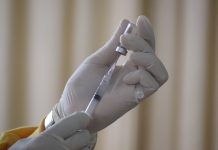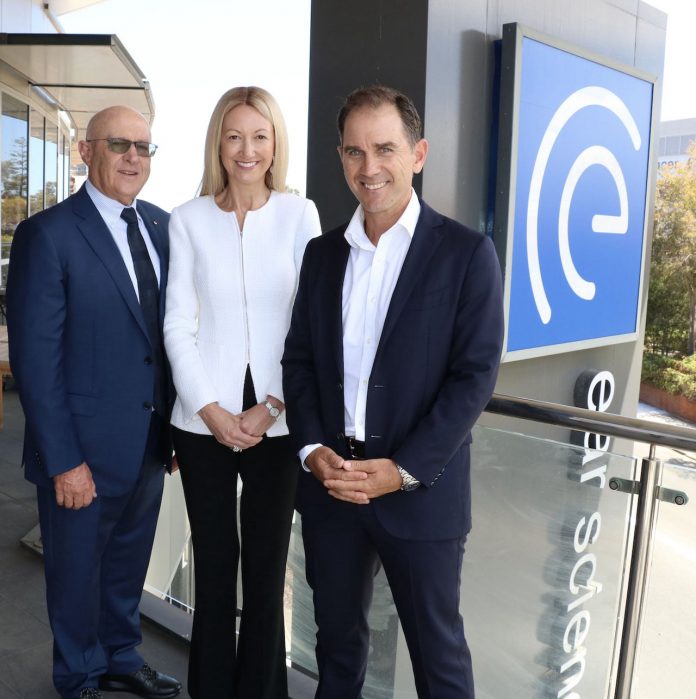Australian cricket coach Justin Langer’s father was about the same age as Langer is now, when he permanently lost his hearing.
Langer, now 50-years-old, started having his own hearing issues and worried that he was going down the same path as his dad.
Speaking to Have a Go News from Adelaide in the lead up to the First Test between Australia and India he said his own hearing issues had played a significant part in him taking up a role as an ambassador for the Ear Science Institute Australia in Perth, which operates the Lions Hearing Clinic.
Langer spent nearly five months in England in 2019 for The Ashes and The World Cup.
Just before the first World Cup game he started to get ringing in his left ear.
“It was really bizarre,” he said.
“I describe it like in Star Wars when they start having their sword fights with lightsabers and this ringing is going on in my left ear.
“Then I went down for a day when I had no energy for a lot of the day – and things progressed from there.
“I was getting this constant tinnitus which affects a lot of people around the world, a constant ringing in my left ear and then I started getting other vestibular problems, really bad vertigo. Then I was diagnosed in January with vestibular migraines, which was having a huge impact on me personally because I just felt sick the whole time with vertigo and imbalance issues and then the ringing in my ear.
“I describe it like I was seasick and drunk for nearly nine months.
“But then thankfully I met an incredible vestibular physio in Perth which had a big impact, and I met an incredible neurologist Vincent Seet, who diagnosed my vestibular migraine – and from there at least I had some peace physically and mentally.”
Langer said that while, at 50, he thought he was a little young to be having hearing problems, he’d since learned that these kinds of issues can affect people of any age.
“Because my father had an acoustic neuroma, which is basically a brain tumour on the auditory nerve, when he was about my age, I started getting really nervous and hoping that wasn’t what was happening to me because I was getting very similar symptoms.
“I had brain scans and they were all fine, but he lost his hearing permanently 20-odd years ago, after a six or seven-hour operation to have the tumour removed.”
Langer says he wonders about loss of hearing when he is sitting in a room with his family.
“I have four daughters, so when the girls are all talking maybe I just tune out, but they’ll often say ‘Dad, did you hear what I just said?’
“I think I did, or maybe I didn’t which is a bit of a worry.”
Langer says there is also a degree of embarrassment when it comes to admitting to hearing issues.
“As an Aussie bloke and certainly in my role, I kept putting the mask on, because I couldn’t show my players, or the public – and my family would see that.
“I’d come home from a day’s work and I would almost collapse on the couch because not only was I going through the symptoms on the physical side, but I was putting the mask on and that takes energy as well because you’re almost faking it the whole time.
“I’ve come to recognise it’s part of the role as a leader that you have to try and stay as calm as possible regardless of what’s going on. While I wouldn’t say I was embarrassed when my wife or the kids say ‘did you hear what I just said?’ you say ‘of course I heard’, but you start worrying that maybe something is going wrong.”
When director of the Ear Science Institute Australia, Professor Marcus Atlas heard about Langer’s hearing issues he got in touch about him becoming an ambassador.
Langer was put on medication and when he gets acute vertigo, he goes to see physio Kate Wisbey who uses manoeuvres to remove the crystals in his inner ears.
“For so long, I had no idea what was going on, but I remember meeting Kate for the first time, and she said: ‘yep, I know exactly what this is and I’m going to fix it’.
“I thought ‘oh yeah, I’ve heard all this before’, but she actually did, which puts your mind at rest because if I get this acute vertigo, I know I can go and see her and she’ll fix it up.
“Then I went to see Dr Seet, who diagnosed me with all these other issues. He told me I was getting vestibular migraines and they would put me on a medication which would make a difference – and it did.
“The medication and physio have made a huge difference.
“I’ve spoken to people about the tinnitus and they give you a few lifestyle ideas that can make a difference.
“It’s nice to know what’s going on because the scary bit is when you don’t know what is going on and you feel rubbish the whole time and it has a real effect on you, not just physically, but mentally.
“You are searching for answers and it’s not until you meet these great people who are around, that can make a difference.
“The other thing about the Ear Science Institute Australia was that we have a world class research facility right on our doorstep in Perth next door to St Joseph’s Church in Subiaco which I’ve been going to since I was a little kid.
“I always knew it as the George Jones Centre, because I know George and he’s a brilliant person and a proud West Australian, which is the other thing that drew me to it, also it’s right here on our doorstep.
“Growing up I’d always been hearing about the Lions Hearing Clinics but didn’t really have any idea what it was about – and now I do – so becoming an ambassador for the Ear Science Institute and giving some West Australians awareness that we have this world class, world renowned medical research on our doorstep, we have incredible resources in WA who can help, which will hopefully make a difference to people.”
Langer’s main objective as an ambassador will be to encourage everyone to get their hearing checked and to strive for early intervention when it comes to hearing related issues, similar to his own.



































